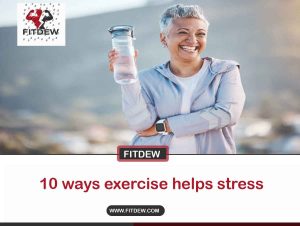In the fast-paced and demanding world we live in, stress has become an almost inevitable part of our daily lives. One powerful antidote to this modern-day challenge is regular exercise.
Beyond its well-known benefits for physical health, exercise plays a profound role in alleviating stress and promoting mental well-being.
Today, we will explore 10 ways exercise helps stress so you understand how adding exercise to your routine can significantly contribute to stress reduction and cultivate a healthier mind-body connection. Remember to balance your exercise routine so you don’t get addicted to exercise.
If you are interested in working out in gyms, you can check out information about Gyms in Sacramento California, gyms in Owerri, gyms in Perth UK, gyms in Ontario Canada, and gyms in Pretoria.
There are so many things you can check about gyms before joining any of the gyms. As a woman having the right things you need for your workout in your gym bag will help you have a nice workout experience. Read till the last dot to get the details you need.

10 ways exercise helps stress
10 ways exercise helps stress
Here are 10 ways working out will help you ease stress
It improves your mood
Working out enhances your mood for many reasons. A lot of people decide to engage in exercise when they wake up in the morning because stretching the muscles is a nice wake-up call for the mind and body. People who begin their day with exercise are known to have more energy to last throughout the day when compared to those who do not exercise in the morning.
It Increases endorphins
Studies confirmed being physical, sweating out, and working out boosts the endorphin production in your body.
Endorphins are feel-good hormones and act as the natural pain reliever. Even if the muscles feel sore after an intense workout, you will notice a physical feeling of satisfaction which is your general outlook. After a light exercise, if you feel energized, that is the work of mass production of endorphins.
It Calms the mind and fights depression
Engaging in exercise is generally repetitive and routine. Repetitive actions like exercise routines help the mind stay focused as well as become calm. Exercise is said to encourage muscle meditation when the muscles are focused on a particular action.
Continuous exercise can assist in fighting depression. Also, exercising and concentrating on your body can assist you in toning out other thoughts.
An increase in feel-good hormones enhances your motivation to spend more time with your family and friends and this increases your social health too.
When you exercise regularly, whether at the gym or jogging in your regular route, you get to meet new people who can become your friends and this increases your social circle.
It Enhances self-confidence
Exercise enhances your self-confidence generally. When you regularly exercise, you become more aware of your physical health and mental health.
Engaging in exercises continuously assists you in keeping fit, staying healthy, and maintaining your body. It can enhance your self-confidence and self-esteem. Also, exercising regularly can help you get the body you have always wanted and this is good for your confidence.

10 ways exercise helps stress
It improves memory and learning
Exercising promotes the production of neurohormones like norepinephrine that are associated with enhanced cognitive function and learning. It then means exercising will reduce the impact of stress on your body and enhance your memory and learning.
It helps the body communicate better
Engaging in workouts assists your body to communicate in a better way. Exercising pushes the body’s physiological systems to communicate much more closely than usual (The American Psychological Association has this to say about exercise).
The systems are involved in stress response such as with the cardiovascular or muscular system. The more the body systems work in harmony, the better the management of stress.
It assists you to sleep better
Lack of sleep affects the normal functioning of your body and results in more stress and anxiety during the day. Exercising can be helpful because it makes you sleep better.
It assists you in organizing your life better
Following up with your exercise routine assists you with setting goals and adhering to a set routine. And you can bring the same learning to your work and home life.
Exercise can reduce the negative effects of stress
It decreases the negative effects of stress. It provides stress relief for your body while imitating effects of stress like flight or fight response, and assisting your body and its systems in practicing how to work together through those effects.

10 ways exercise helps stress
Tips for Adding Exercise into a Stress-Relief Routine
Plan your meals and snacks
Eating a balanced diet rich in whole foods is crucial for reducing stress. Plan your meals and snacks to make sure that you have healthy options available all day.
Stay hydrated
Dehydration can enhance the feelings of stress and anxiety. Ensure you drink at least 8 glasses of water each day and as well limit your intake of sugary drinks and caffeine.
Add physical activity into your day
Since exercise is a powerful tool for reducing stress, you can try adding physical activity into your daily routine, whether going for a walk during your lunch break, taking a yoga class, or hitting the gym after work, make sure you engage in physical activity every day.
Make exercise enjoyable
Discover activities you enjoy and add them to your lifestyle. This will make it easier to stick to a regular exercise routine and will assist you to reap the benefits of stress reduction.
Ensure you get enough sleep
Enough sleep is crucial for the reduction of stress and enhancing overall health and well-being. Ensure you get at least 7-8 hours of sleep each night, and establish a regular sleep routine to assist you in falling asleep easily.
Practice mindfulness
Mindfulness practices like meditation and deep breathing exercises can assist in reducing feelings of stress and anxiety. Add these practices into your daily routine to assist you in staying calm and centered.
Limit alcohol and caffeine
Taking alcohol and caffeine can increase feelings of anxiety and stress. Have a limit to your intake of alcohol and caffeine, and consider healthier alternatives like herbal tea or sparkling water.

10 ways exercise helps stress
Conclusion on the 10 ways exercise helps stress
Regular exercise offers a multifaceted approach to stress relief, positively impacting both physical and mental well-being.
It serves as a potent outlet for pent-up tension, releasing endorphins that act as natural mood elevators. Secondly, exercise promotes better sleep, a crucial element in stress management.
Also, it enhances cognitive function, fostering a clearer mindset to tackle stressors. Furthermore, the social aspect of group activities or team sports can provide a valuable support system, reducing feelings of isolation.
The physiological changes induced by exercise like improved cardiovascular health, contribute to an overall sense of resilience against stressors.
Adding exercise into your routine also establishes a healthy coping mechanism, reducing reliance on unhealthy stress-relief methods.
The rhythmic nature of many exercises, such as running or yoga, can induce a meditative state, promoting relaxation and mindfulness.
Frequently Asked Questions about 10 ways exercise helps stress
How does exercise help reduce stress?
Exercise helps reduce stress by promoting the release of endorphins, which are natural mood lifters. It also reduces levels of stress hormones like cortisol.
What types of exercises are most effective for stress relief?
Aerobic exercises such as jogging, swimming, and cycling are effective, as well as activities like yoga and meditation that combine physical activity with relaxation techniques.
How often should I exercise to manage stress?
Aim for at least 150 minutes of moderate-intensity exercise per week, as recommended by health authorities. This can be divided into shorter sessions throughout the week.
Can intense workouts contribute to stress rather than alleviate it?
While moderate exercise generally reduces stress, intense workouts without proper recovery may contribute to stress. It’s essential to find a balance and listen to your body.
When is the best time to exercise for stress relief?
The best time to exercise is subjective and depends on individual preferences. Some people find morning workouts invigorating, while others prefer evening sessions to unwind after a stressful day.
Editor’s Picks
What is Zumba Dance Workout? And Its Benefits
Eco-Friendly Activewear manufacturers